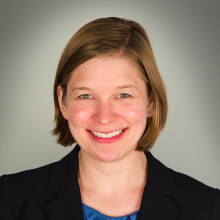February 2011 Spotlight on the SRCD Policy Fellow: Sarah Oberlander, Ph.D.
2010-2011 Federal Executive Branch Policy Fellow
I am very fortunate to be continuing as a second year policy fellow with the Society for Research in Child Development (SRCD), with a placement in the Office of the Assistant Secretary for Planning and Evaluation (ASPE) in the U.S. Department of Health and Human Services (HHS). It is an exciting time for researchers to work at HHS, given the focus on evidence-based programs, practices, and strategies. Completing a second year of the fellowship has allowed me to deepen and broaden my involvement in projects that began in 2009. I have been able to use and expand my content and research knowledge, gain a better understanding of policy, and continue to develop professionally.
During my second year, I continue to co-staff the Interagency Working Group on Youth Programs (Working Group), which is a collaboration of 12 federal agencies working together to improve programs and services for youth. Over the past several months, I have developed content for the Working Group’s website, FindYouthInfo.gov, and writing for the web has afforded me the opportunity to practice writing for public audiences. I have also been able to broaden my content knowledge through work across different youth issues, such as bullying and youth violence prevention. One of the Working Group’s charges is to develop an overarching federal strategic plan for youth policy. In 2010, I was able to attend several listening sessions around the country with groups of stakeholders, including youth. These sessions, along with many other opportunities, provided the input for the Strategic Plan, which the Working Group is writing in 2011. The Working Group organizes one conference per year, and right now we are developing an agenda for a federal forum that will allow participants to explore how federal departments and agencies promote and prioritize the development and implementation of evidence-based strategies for youth.
I also remain involved with HHS’ Teen Pregnancy Prevention Initiative. The Consolidated Appropriations Act of 2010 (Public Law 111-117) provided $110 million within HHS’ Office of Adolescent Health (OAH) to replicate programs that have been proven effective through rigorous evaluation to prevent teen pregnancies or associated sexual risk behaviors, and to test new and innovative practices. The Affordable Care Act also provided $75 million to the Personal Responsibility Education Program, managed by HHS’ Administration for Children and Families (ACF), which includes grants to States and Tribes to replicate evidence-based programs and test innovative strategies. Along with my ASPE co-workers, I am part of a federal evaluation coordination team, which involves staff at OAH, ACF, and the Centers for Disease Control and Prevention (CDC). The goal of this team is to coordinate the three complementary federal evaluation studies and the rigorous local evaluations that have been required of some grantees. It is exciting to be involved at the early stages of this effort, which I hope will push the field forward by promoting rigorous evaluation designs and the identification and replication of evidence-based strategies.
My portfolio includes homelessness, specifically issues affecting homeless children and youth. I have been able to visit several ACF-funded runaway and homeless youth-serving organizations around the country, including maternal group homes for pregnancy and parenting young women. Having the opportunity to learn directly from program staff and youth has been an important introduction to the complex set of issues participants face. In the future, I hope to continue exploring how complex trauma histories often precede human service and juvenile justice program involvement, and how trauma may affect the successful transition to adulthood.
An invaluable asset of the SRCD fellowship is the time and funding to continue my professional development. Last year, I had the opportunity to attend the Early Childhood Longitudinal Study-Kindergarten Cohort data training from the Department of Education’s Institute of Education Sciences. I attended the training with the goal of learning to analyze data from a weighted, nationally representative data set. In my analyses thus far, I have identified trajectories of poverty status over time, and used those trajectories to predict children’s academic and social/emotional outcomes in 8th grade. I was also able to take a three-day course on Outcome and Impact Evaluation, which provided helpful knowledge for the Teen Pregnancy Prevention Initiative federal evaluation activities. Along with the other SRCD fellows, I will be attending the upcoming SRCD Biennial meeting in Montreal, presenting on my fellowship experience and my own research projects. For those of you attending the meeting, I encourage you to attend the SRCD Policy Fellowship Panel and Reception, on Thursday, March 31, from 4:30 to 6:10pm in Palais des Congrès, Room 525 AB. The session will include brief presentations by all of the current SRCD fellows, as well as an opportunity to meet and greet former fellows.
